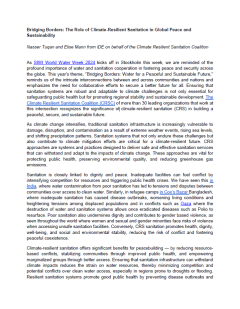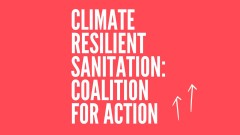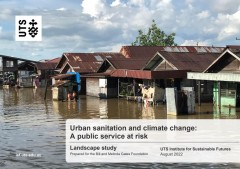 translate page
translate pageSanitation and the climate crisis are intrinsically interlinked. Sanitation systems are vulnerable to climate events that damage infrastructure, disrupt services, and displace people. This results in increased health risks and pollution that impacts ecosystems, with low-income and marginalised populations disproportionately impacted. Additionally, poorly managed sanitation is a significant greenhouse gas emitter, particularly through methane emissions from latrines and septic tanks.

Figure 1 Interrelationship of sanitation and the climate crisis.
To address this situation, in 2022 the Climate Resilient Sanitation Coalition was launched in response to the joint Call to Action launched at COP27. The Coalition was formalised under the vision of:
Integrating sanitation into global and national climate policy & practice; and integrating climate into global and national sanitation policy & practice.
The coalition is a growing collaboration of international organisations, research organisations and practitioners working collectively towards improved prioritisation, capacity and investment in climate resilient sanitation. Currently Coalition members represent almost 35 organisations implementing climate resilient sanitation (CRS) programs in almost 80 countries.

Figure 2 CRSC Member Activity Countries
Operating at a global level, the Coalition currently has five workstreams:


Nasser Tuqan and Elise Mann on behalf of the Climate Resilient Sanitation Coalition (CRSC) (2024)
Bridging Borders: The Role of Climate-Resilient Sanitation in Global Peace and Sustainability

Climate Resilient Sanitation Coalitation (CRSC) (2024)
CRSC - Member Resources on Climate Resilient Sanitation

Willetts, J Kumar, A, Mills, F (2022)
Urban sanitation and climate change: A public service at risk
Seeking information for a Climate Resilience Sanitation Assessment in Cotonou
By AlexandraDubois (18.10.2023)
New WG 3 Co-Lead: Introduction of Martin Kerres (GIZ)
By MartinKerres (13.05.2022)
Updates about SuSanA Working Group 3 and new title: "Climate mitigation and adaptation, including renewable energy, energy efficiency and resilience"
By ThorstenR (05.08.2021) , further replies by: Elisabeth, Soeren
(total 3 replies)
SuSanA WG3 (Climate Change & Renewable Energies) Get-together on 27 August in Stockholm - Summary of discussion
By annetempel (15.10.2019) , further replies by: annetempel, KatieAllen54
(total 4 replies)
Bisi Agberemi, UNICEF Juliet Willetts, UTS 

bagberemi@unicef.org juliet.willetts@uts.edu.au
Share this page on